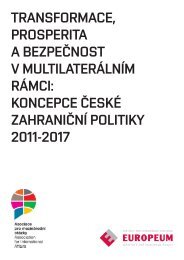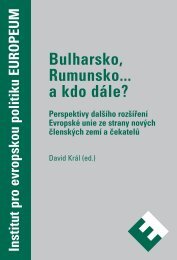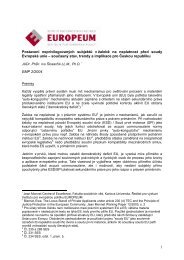eu constitutionalisation - EUROPEUM Institute for European Policy
eu constitutionalisation - EUROPEUM Institute for European Policy
eu constitutionalisation - EUROPEUM Institute for European Policy
You also want an ePaper? Increase the reach of your titles
YUMPU automatically turns print PDFs into web optimized ePapers that Google loves.
Chapter 6: A ‘saut constitutionnel’ out of an intergovernmental trap?5. CONCLUSIONS AND FURTHERPERSPECTIVES: A MIXED ASSESSMENT5.1. An exit from the intergovernmental trap?The reading of the legal text points at considerable changes in the wordingbut would that lead to a better per<strong>for</strong>mance in the living constitutionafter ratification?A ‘saut constitutionel’ is difficult to discern. The provisions <strong>for</strong> the CFSP donot match the self-praise of the Convention which claims that “it proposesmeasures to increase the democracy, transparency and efficiency of the<strong>European</strong> Union”⁶⁵. The ideational cosmos about the EU’S role has beenincrementally extended, the written constitution has, however, neitherprovided <strong>for</strong> the legal instruments, nor the material resources or <strong>for</strong> theinstitutional architecture and procedural dynamics to meet the ambitiousself-set objectives.Again, the provisions merely refine the intergovernmental procedures,taking some limited steps towards pooling and merging national andsupranational resources. The ongoing tensions and conflicts are clearlydocumented in the new office of the UMFA; this creation is an ideal typerepresentation of an institutional “fusion”⁶⁶ which hides the schizophreniabetween two pillars.Thus based on past experiences we would claim that the CFSP will workmore efficiently in the day to day diplomatic business; it will reduce someweaknesses like the external visibility, but might create new problemsof internal rivalry. The per<strong>for</strong>mance of EU crisis management – in South-Eastern Europe and elsewhere – will be an important test <strong>for</strong> the new provisions<strong>for</strong> CFSP/ESDP. The fundamental test however will be the reactionto international crises of high intensity, where vital national interests of themember states and of other international actors are at stake. From the newprovisions with their limited impact on national sovereignty we cannotexpect that they will make a major difference <strong>for</strong> the shaping of a global65) <strong>European</strong> Convention (2003).66) WESSELS (2004).224Chapter 6: A ‘saut constitutionnel’ out of an intergovernmental trap?actor. The title of a ‘Foreign Minister’ will not be sufficient to overcomedeep cleavages among member states. In these cases past experiences and<strong>for</strong>mer paths let us argue that national interest <strong>for</strong>mulations and the internallogics of domestic policy will dominate the soft norms of group disciplineas <strong>for</strong>mulated again in the relevant articles of the constitutional treaty. Evena strong “identification with Europe in general”⁶⁷ will not be sufficient tosupport a common or even supranational strategy.In sum, the gap between ambitious goals and allocated capabilities remainswide. Following this reading this analysis expect an output failure alreadyin an early experimental phase of applying the constitutional text, becausethe soft disciplinary instruments of a weak pressure group will not workagainst non-compliance: in such a scenario the treaty would not create, overtime, its own “loyalties”⁶⁸, but damage the constitutional authority of theEU – not only with regards to the CFSP, but will also impact on the Union’scredibility to “build a common future” (Art. I-1 (1)). Obvious failures in<strong>for</strong>eign and security policy will affect the value of the constitutional textas a common mobilising <strong>for</strong>ce. Thus if we assume that the efficiency andeffectiveness of the CFSP will only be improved within the day-to-daydiplomacy, but not in high politics crises, then the future output legitimacyof the CFSP and thus the EU overall will also not be upgraded. Underthese conditions, the failures of the CFSP chapters might have a negativespill back effect on other parts of the text. The very term of ‘constitution’would be damaged, and thus the constitutional ‘myth’ might be put at riskin a fundamental sense.To turn the argument around: The successful use of these provisions will bea core factor <strong>for</strong> creating or rein<strong>for</strong>cing a “constitutional moment”⁶⁹ leadingtowards a “constitutional patriotism”⁷⁰.Thus the <strong>constitutionalisation</strong> processin this policy field has not come to an end – even if the constitutionaltreaty and the revisions of the IGC will have been ratified.In line with the assumptions of a negative scenario of non-ratification,major institutional weaknesses of CFSP will persist: the rotating Councilpresidency which reduces the continuity and the visibility of EU Foreign67) KOENIG–ARCHIBUGI (2004), p. 147.68) WEILER (2002), p. 596.69) ACKERMANN (1998) p. 409.70) See HABERMAS (1996).225








